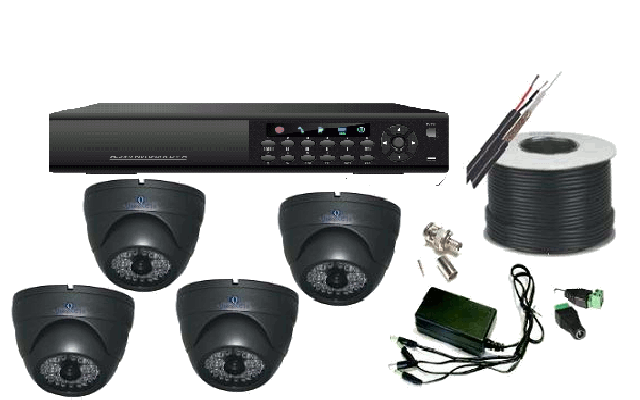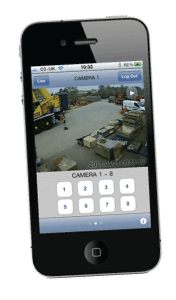CCTV Systems
Closed Circuit TV Systems were once the reserve of big corporations and high security establishments but, thanks to advances in technology, CCTV is now available to everyone.
Protection of your premises is unfortunately something that needs to be taken very seriously. We offer simple camera systems for the domestic market, where discreet cameras are mounted on the perimeter of your house. The cameras are wired back to a small hard drive unit and a small flat-screen monitor that can be sited in the Kitchen or Study.
Domestic Camera System
- 4 CCTV cameras with built in infra-red LED
- Colour System
- 160 GB DVR internet ready hard drive
- 15" Flat screen monitor
Domestic PIR Alarm System
- PIR Detectors
- Alarm Panel and Keypad Remote
- Sounder with Strobe
- Decoy
CCTV - Remote Access over the internet
Modern CCTV surveillance digital video recorders (DVRs) have a network Ethernet port that allows users to access the DVR and connected cameras over a network, like a home broadband WiFi network. In the case of CCTV DVRs, all of the cameras are hard wired to the DVR using coax cable and the DVR is connected to the home broadband WiFi router that enables the video streams of the cameras to be viewed over a network using some type of client, such as a web browser on a desktop or laptop computer or using a mobile app from an iPhone, Windows or Android mobile phone. In order to make the DVR accessible remotely over the Internet, setting up port forwarding is necessary to route Internet traffic into your local network.
The routing of internet traffic requires a static address that never changes. There are two ways this is achieved; obtaining a static IP address from your internet service provider (ISP), which may be chargeable depending on the ISP, or using Dynamic Domain Name Service (DDNS). DDNS is a service that provides you with a host name to access your DVR remotely. This service is necessary if your Internet connection uses a dynamic IP address. Dynamic IP address means that the IP address that your ISP provides you with can change each time that you connect. The opposite is a static IP address which means that each time you connect your ISP always assigns you the same IP address.
Modern CCTV surveillance digital video recorders (DVRs) have a network Ethernet port that allows users to access the DVR and connected cameras over a network, like a home broadband WiFi network. In the case of CCTV DVRs, all of the cameras are hard wired to the DVR using coax cable and the DVR is connected to the home broadband WiFi router that enables the video streams of the cameras to be viewed over a network using some type of client, such as a web browser on a desktop or laptop computer or using a mobile app from an iPhone, Windows or Android mobile phone. In order to make the DVR accessible remotely over the Internet, setting up port forwarding is necessary to route Internet traffic into your local network.
The routing of internet traffic requires a static address that never changes. There are two ways this is achieved; obtaining a static IP address from your internet service provider (ISP), which may be chargeable depending on the ISP, or using Dynamic Domain Name Service (DDNS). DDNS is a service that provides you with a host name to access your DVR remotely. This service is necessary if your Internet connection uses a dynamic IP address. Dynamic IP address means that the IP address that your ISP provides you with can change each time that you connect. The opposite is a static IP address which means that each time you connect your ISP always assigns you the same IP address.
Security Systems maintenance
Regular maintenance of your security system by a qualified engineer is essential to ensure that the equipment is working properly and potential issues are resolved. This will help reduce false alarms and ensure that the alarm will be raised in the event of an actual break-in.
If you take out a maintenance contract with us, your alarm and security system will be inspected and tested annually or every six months depending on the type of system that you have installed. As a contract customer, you are entitled to 24-hour callout cover (4 hour response for communicated systems), 365 days a year.
Our maintenance packages are flexible and can be designed to suit your needs and budget. However, if you do not want to take out a maintenance contract with us, we do offer one-off call-out fees for our engineers to come out; this can be arranged upon request.

